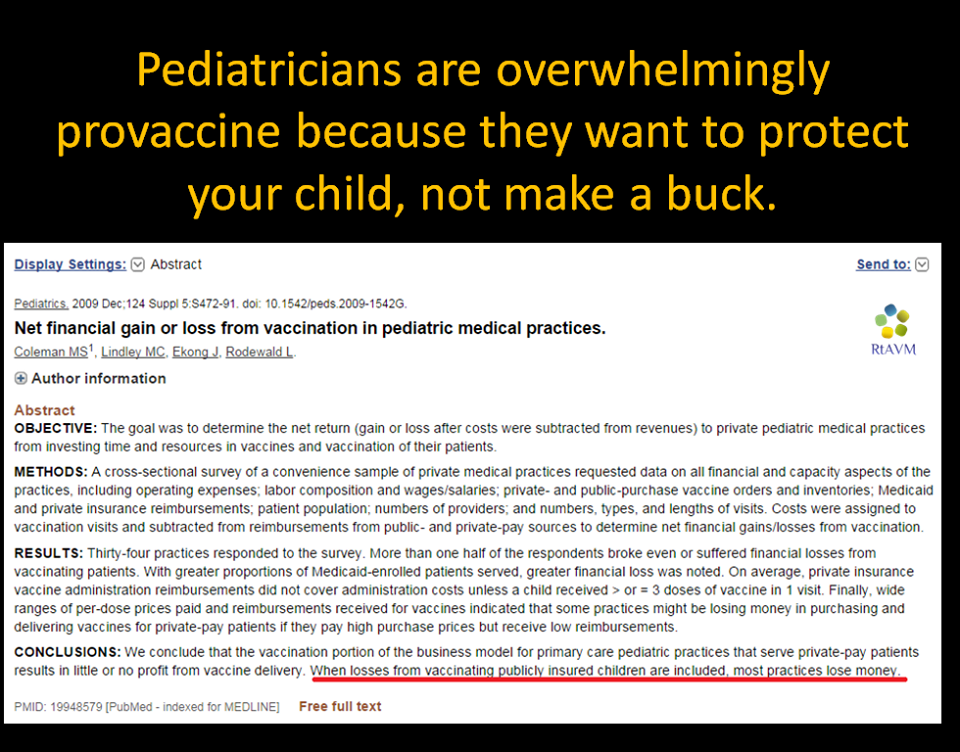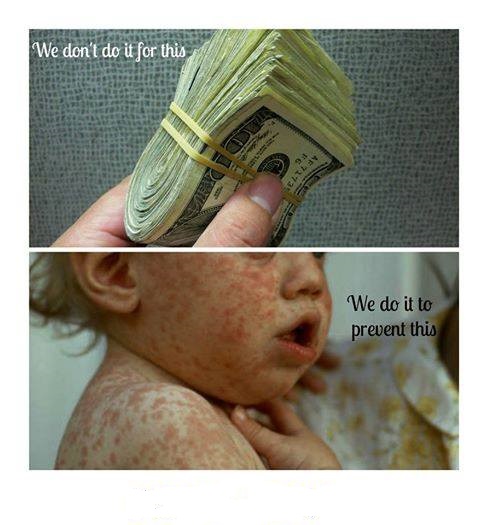Are Doctors’ Vaccine Recommendations Motivated By Profits?
This guest post has been written by Dr. Lara Zibners, in response to comments we’ve received on our Vaccinate Your Baby Facebook page.
“How can I trust the vaccine recommendations that I get from my doctor? After all, isn’t she the one making money off all of these shots?”
Have you ever heard this concern or something like it? How many parents do you know who are leery of a doctor’s vaccine recommendations because they think the doctor is simply motivated by profits?
The idea that pedi atricians are colluding in some giant immunization scam that is designed to fund their fancy vacation homes and expensive watches is a concern for some. But could it be true? Does your pediatrician look at your child, pinch those pudgy thighs and inject vaccines against life-threatening illnesses while dreaming of a new car? It’s a pretty disgusting thought, isn’t it? The idea that your child’s doctor could have a financial incentive to encourage vaccination is an upsetting one. One that would understandably get your panties in a twist, right?
atricians are colluding in some giant immunization scam that is designed to fund their fancy vacation homes and expensive watches is a concern for some. But could it be true? Does your pediatrician look at your child, pinch those pudgy thighs and inject vaccines against life-threatening illnesses while dreaming of a new car? It’s a pretty disgusting thought, isn’t it? The idea that your child’s doctor could have a financial incentive to encourage vaccination is an upsetting one. One that would understandably get your panties in a twist, right?
Well, my friends, relax. You can unwind your knickers because it’s simply not true.
Now, let me start by telling you that this is not a discussion of physician salaries as a whole. (Although I will point out that pediatricians are the 2nd lowest ranking physicians by salary in the United States.) Or whether they deserve a salary that averages in the low six figures. (Even though that’s after the usual investment of 40,000 hours of training and $300,000 in expenses). We’re not going into those topics today but instead, we’re going to focus on one specific question: do pediatricians make money from immunizations?
And the answer is “No.” Despite what some people think, vaccines aren’t the cash cow everyone seems to think they are.
It’s estimated that it takes 35 office visits and costs around $2500 to fully vaccinate a child through age 18. But providing immunizations goes beyond just providing the vaccine. There are plenty of additional costs. These include direct costs such as vaccine purchase, storage, staff time to handle, oversee and administer the vaccine, as well as indirect costs such as insurance against vaccine loss.
And pediatric offices deliver the majority of immunizations. Eighty percent in fact. It’s a huge part of well-child and preventative care. Which makes them a daily topic in any pediatric practice. But what many people don’t realize is that vaccines are the second highest expense for a pediatric practice after employees. As in doctors, nurses, receptionists, and that poor lady who has to deal with the insurance companies. Think about that.
But why are vaccines such a large expense for the pediatrician?
Well, vaccines vary in cost (in one study between $4 and $30 per dose) and that figure can vary depending on the circumstances. For instance, how complicated is it to produce a vaccine? How many years of research went into the vaccine? How much did it cost to develop? And how much money was spent on the various stages of clinical trials before the vaccine receives FDA approval for use? Because, yes people. It’s true. Pharmaceutical companies spend years developing and testing the vaccines they produce to ensure they are as safe and efficacious as possible. Not to mention there is a large investment that goes into the development of a new vaccine without any assurance that the vaccine will be ultimately approved or even recommended. And as much as I’m sure companies would like to create and distribute vaccines for free because they know they save lives, they also have to cover their costs at the end of the day. That’s just life. And if a pediatrician wants to offer immunizations, she has to do her part too and buy them. Before she can give them. Cash upfront.
So the money comes out upfront. And the vaccines are stored and inventoried and insured. And then you walk through the door with little Tommy, braced for his scheduled injections. You pass your insurance card through the little window and that’s it. Your doctor’s back in the black, right? Well, not exactly. Practices are reimbursed for the costs of the vaccines (and associated expenses) either through private insurance or through public insurance (think Medicaid or CHIP). But the insurance company has to be billed. Then someone has to process the claim. Cut the check. Put it in the mail. And so on. There is a real delay between purchasing vaccines and the insurance reimbursement for the delivery of the vaccine. While your doctor is still out-of-pocket.
So the payment finally arrives. But wait. The reimbursement often doesn’t cover the full cost of the vaccine, let alone the total cost of delivering that vaccine. The average reimbursement by public insurance is less than $10 and for private insurance, it’s only a bit higher. Maybe somewhere in the neighborhood of $17.
To sum it up, even when an office is paid for the delivery of an immunization, nearly half of reimbursements don’t cover the cost to the practice. And if the vaccine reimbursement doesn’t pay for the vaccine itself, it certainly doesn’t cover the ultimate cost to the pediatrician, let alone for the receptionist, the nurse, the computerized charting system, Highlights magazine (remember that?!), sterilizing systems for the toys, or food for the tropical fish tank that keeps your kids from going bananas while waiting to be seen. Vaccines are not the pediatrician’s cash cow. Hopefully, you’re beginning to understand that now.
So why do general pediatricians continue to give vaccines?
For those of us who have dedicated our lives to ensuring the health and safety of children, it’s not about the money. It’s the genuine belief that immunizations are one of the most important ways to protect individual patients and society as a whole. It’s an undisputed fact that giving vaccines is a financial disincentive for pediatricians. Nearly 10% of pediatricians have seriously considered no longer providing vaccines because of the economic strain involved. Which is scary. If your child’s doctor doesn’t give immunizations, it’s going to be quite a bit more difficult and inconvenient for you to get your little one vaccinated, isn’t it?
As for me, I’m not even a general pediatrician. I am an ER pediatrician. Which means I’m paid a salary. If one cute 3 year-old patient with a Lego in his nose shows up between 7am and lunchtime, I’m paid the exact same as I would be if an outbreak of measles brings the patient volume to a level fondly known as “heaving,” without a room to spare and a line stretching out the front door. Of course, I’m not the only pediatrician who is paid this way. Many doctors who work in hospitals or clinics are also salaried employees. Far fewer physicians are in private practice now than in the past. And like me, they’re paid exactly the same whether we order a vaccine or not.
In my current position, I don’t give routine vaccines. I give emergency room vaccines. Like a tetanus booster to a child who has a nasty wound. A little one who was sleeping in a room where a bat was found will get rabies prevention. Occasionally, I’ll give a dose of varicella vaccine to a kid who is just shy of her 1 year well-visit, who has a sister with leukemia, and has been exposed to chickenpox. But when I do administer vaccines it’s the hospital that purchases the supply, bills the insurance, and recovers the money (if there is anyone to bill). I don’t get paid one tiny little extra penny more.
But I assure you I still care if a kid is up-to-date on their vaccines. Because in my line of work, it’s the baby battling whooping cough, who turns blue and stops breathing, that makes me so passionate about vaccines. Or the encephalopathic kid with measles that is having seizures and needs a ventilator to breathe. It’s the vicious stink of Rotavirus that creeps down the halls. Or the child with group A streptococcal sepsis secondary to chickenpox who needs blood pressure support and an ICU bed.
But please, rest assured, it’s most definitely not the money.
Dr. Lara Zibners is board certified in both general pediatrics and pediatric emergency medicine. As the author of the award-winning book “If Your Kid Eats This Book, Everything Will Still Be Okay,” and a hilarious blog, Dr. Zibners has been an avid and very public supporter of vaccination.



